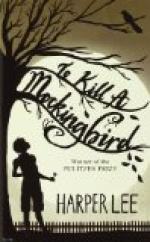|
|
To Kill a Mockingbird Topic Tracking: Innocence
Chapter 1
Innocence 1: Scout tries to explain to her teacher that she is embarrassing Walter Cunningham by offering him something that he won't be able to pay back. Scout realizes that because her teacher isn't a local, she won't know that about the Cunninghams, but Scout's explanation gets her into trouble. She wasn't trying to be insulting, but Miss Caroline mistook her frank and innocent explanation as condescension or rudeness and punished her for it. Scout's perception of the world and her classmates is not yet marred by the social divisions that adults see.
Chapter 3
Innocence 2: Scout really does insult Walter this time as she questions the way he eats and makes him feel self-conscious. She's not doing it intentionally -- she's just curious because she's never seen people who eat that way. She's too young to understand the social graces of Southern hospitality that dictate that you always make people feel at home and welcome no matter how unusual their habits may be.
Chapter 5
Innocence 3: Dill asked Scout to marry her more because she was one of the only girls he knew than because he loved her. They are too young to understand what marriage means or why people marry, so they just pretend as a way of feeling grown up.
Innocence 4: Jem didn't realize that without actually saying that they were playing the Boo Radley game he still admitted to his father that that's what they were doing. His father used a courtroom technique to make his son confess, and it bothered Jem because he hadn't expected that from Atticus.
Chapter 6
Innocence 5: Although Atticus made threats to his children all the time, he'd never whipped them. Jem didn't want to have to disappoint Atticus by explaining that he'd deliberately disobeyed him, so he went back for his pants despite the danger of it. He didn't want to change the nature of his relationship with Atticus by making him punish Jem.
Chapter 7
Innocence 6: Jem realized that it was Boo Radley leaving little gifts for them in the knothole of the oak tree, and he was crushed when Nathan Radley cemented up their only line of communication. Nathan said he did it because the tree was dying, but it was obvious to Jem that he did it just to keep them from communicating with Boo, and it made him sad.
Chapter 8
Innocence 7: When Atticus suggested they return the blanket to the Radley house, Jem poured out all the secrets they'd been keeping about their contact with Boo Radley and how Nathan found ways to prevent it. Jem didn't want to return the blanket because he didn't want to get Boo into trouble since he'd never done anything but help them out although he'd had plenty of opportunity to hurt them. Jem realizes that Boo is a friend in a way and he wants to protect him, so he was willing to expose all his secrets to Atticus in order to protect Boo.
Chapter 9
Innocence 8: Scout hears her classmates saying terrible things about Atticus because he's defending a black man, but she doesn't see the wrong in what her father is doing. Atticus explains to her that it's not really a bad thing, but some people see it that way. Scout is too young to understand prejudice and injustice. Atticus tries to preserve this innocence by raising her to believe that there is nothing wrong with defending a black man. It's his duty, and so it should be hers as well.
Chapter 10
Innocence 9: It's a sin to kill a mockingbird because they are innocent birds who only live to make music for us to enjoy. That's what Atticus and Miss Maudie told Scout after she and Jem got their air rifles for Christmas. It's a sin to willfully destroy innocence, and a mockingbird embodies innocence.
Chapter 14
Innocence 10: Scout, in all her youthful naïveté, believes that Atticus and Cal need her around to run the house and make decisions. In her mind her role is greatly exaggerated, and Dill has experienced the painful realization that he's not needed as much as he thought he was. He's reached a point of awakening that Scout has yet to reach, but he's no happier for the knowledge he's gained.
Chapter 15
Innocence 11: Scout had no idea that the men gathered around her father were intending to harm him. She disarmed them with her youth and innocence in the way that she talked to Mr. Cunningham as a friend because she knew he'd done business with her father and she knew his son from school. The way she tried to strike up a friendly conversation with him must have reminded him that they were neighbors and friends, and that protected Atticus and Tom Robinson from being harmed by the mob of men from Old Sarum that night.
Chapter 19
Innocence 12: Dill cries after seeing the condescension with which Mr. Gilmer questioned Tom because he was a Negro. Dill believed that it was unfair to treat anyone that way, Negro or not. Dill was still too young to realize that it was commonplace for Negroes to be treated so disrespectfully. Mr. Raymond predicted that in a few years he might notice the injustice, but he would be so accustomed to it that he wouldn't cry over it any more.
Chapter 26
Innocence 13: Scout doesn't understand the hypocrisy her teacher displays in hating Hitler for his prejudice against Jews, yet she hates blacks just as much. The inconsistency bothers Scout and her realization of this double standard among people is the beginning of her awakening to the hypocrisy of most people.




